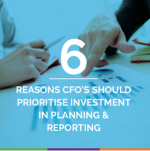The CFO Edge event took place from 9-10 November, 2017 in Sydney. It was a gathering of Australia's best and brightest CFOs, featuring leaders from across 11 industry sectors, who are responsible for 3 per cent of our nation's entire workforce and 7 per cent of our GDP.
The leaders from CFO Edge 2017 represented 3% of Australia's workforce, and 7% of its GDP.
Inside Info was proud to be a silver sponsor of CFO Edge 2017, which brought these leaders together to listen to key presentations, discuss big ideas, and network with important business partners. Now that the event is over, what did we learn from it?
These are the key insights from CFO Edge 2017.
Insight 1: The CFO of 2018
Jan Rudnick, Managing Partner of Adapt - the company responsible for putting Edge events together - kick-started CFO Edge 2017 with a discussion on the future Australian CFO. He covered top investment priorities, the drivers of business success and key challenges moving ahead.
Top investment priorities: Mr Rudnick revealed that CFOs surveyed for the Edge event would be prioritising financial modelling and forecasting in the coming 1-18 months, followed closely by cyber risk and security, external reporting, and compliance and investigations. BI and data visualisation were a medium priority, as were debt funding, collaborative finance and staff retention.
Drivers of future success: By far and away, CFOs believe digital transformation/strategy will play a key role moving forwards, with business intelligence and growth into new markets coming second and third respectively.
Key challenges: Despite being critical to success, data analytics was considered a key challenge by Australian CFOs. Technological change and regulations also appeared as a concern to those polled.
But, Mr Rudnick had some parting words of advice before the event moved on. He advised listeners to keep asking themselves these questions:
- How can I better use my resources?
- How can I create new revenue streams?
- How can I drive better productivity and performance?
Insight 2: Finance teams must harness real time BI
Cox Automotive CFO Dexter Clarke had a lot to say about big data. He feels Aussie companies are spending too much time looking backwards, not forwards. We rely on historical data, and we've honed years of skills trying to use past information to predict future behaviours. But, he said, can we truly move forwards if we're only looking over our shoulders?
One such way to break free from history is to stop considering the "data lake", Mr Clarke stated, but rather to consider the "data river". Where the former is a single store of raw business intelligence information a company has gathered over time, the river is fast-flowing - it represents real-time data.
Think about how much is happening in the digital realm at every second of every day. Mr Clarke showed stats from Sprout Social and Smart Insights that found there are 5 billion Facebook comments left on Pages every day, and there are 6.5 billion Google searches daily. The finance analyst of the future should be mining this information - whether its internal or external - and should be sharing this data with their business partners, who could then share theirs in return.
Insight 3: New technologies are emerging
Three key technologies were discussed over the event, each of which is expected to have huge impact on the financial world.
1: Blockchain
Sophie Gilder, Head of Blockchain at the Commonwealth Bank of Australia, believes the digital technology will enable true peer-to-peer collaboration, and enhance people's business and personal lives.
What is blockchain? If you don't know, blockchain is a type of decentralised information logging that was originally used for cryptocurrencies such as Bitcoin and Ethereum. It's like a digital ledger, where anyone can independently fill out part of a block, and when that block is finished, it moves permanently into the chain. This chain can be accessed by anyone at any time, meaning the information is almost untamperable because it is in so many locations. Companies have used the idea for startups ranging from financing to networking to voting, and most experts agree it will only continue to grow.
For CFOs and their financial teams, blockchain could represent a complete departure from the norm. With cryptocurrencies, there are no need for banks - people can store their own money in digital wallets. But more importantly, Ms Gilder says that blockchain will create a shared, secure database for finance operations - it will make future digital payments a breeze, even to overseas partners, and its security minimises potential risks.
2: Internet of things (IoT)
The world's growing use of IoT could lower operating costs, increase productivity, create new data products, and allow businesses to expand into other markets.
What is IoT? You can read our earlier article about IoT and how Qlik business analytics can help in this area. Basically, IoT represents a vast network of sensors, physical devices, vehicles and actuators linked by software, network connectivity and data analytics. Already it is being deployed by government agencies and private businesses around the world, for uses ranging from traffic and parking monitoring, to building air conditioning or electricity management.
IoT was discussed in detail, especially around how businesses can gain value out of IoT. Foremost, returns come from IoT when it is deployed with advanced data analytics, which captures and sorts the fast-moving data rivers these devices generate. It then displays them in a visual, easy-to-read manner, putting power in decision makers' hands.
But, the architecture required to get quality information from IoT requires a number of additional parts - for context. Some of this may even come from a third party, like we discussed before.
3: Machine learning
Human decisions take time. If time is money, then decision making represents lost revenue.
This is where machine learning is helping businesses grow. Machine learning is about letting an intelligent piece of software absorb millions, if not billions or trillions of permutations and self-teach the best possible outcomes based on those factors. When deployed in key areas, machine learning can take the human decision making out of a process, which speeds up time to completion and allows businesses to scale their operations without harming the bottom line.
In closing
The CFO Edge event 2017 was a great success, and its key lessons are set to be some of the hottest topics moving into 2018. At Inside Info, we understand the importance of utilising advanced, yet easy to read, financial and business analytics. We're one of Australia's top providers of Host Analytics, rated in Gartner's 2017 CPM Magic Quadrants as one of only two leaders in both cloud Strategic and Financial Corporate Performance Management (CPM.)
To find out more about deploying this powerful, agile tool in your company, contact us today.





